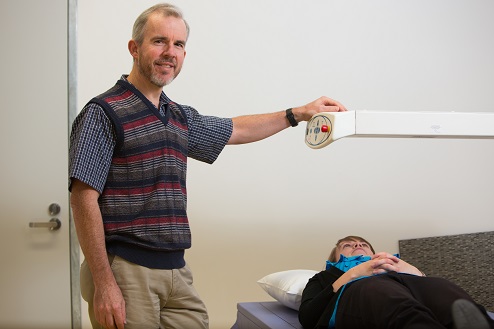Research team named among top 10 for 2013

Research team named among top 10 for 2013
A Menzies project aimed at developing innovative therapies for a disease that affects more than one million Australians has been named as one of the nation's 10 best.
A Menzies project aimed at developing innovative therapies for a disease that affects more than one million Australians has been named as one of the nation's 10 best.
The National Health and Medical Research Council included the work of Professor Graeme Jones and his team in its 2013 honour roll, announced at the end of last year.
Osteoarthritis, the most common form of arthritis, causes pain, reduced mobility and loss of independence and often leads to expensive hip and knee replacement surgery.
Professor Jones and his team wanted to make a real difference to the quality of life for these patients, and to delay the onset of this disease in our ageing population.
"The last 10 years have seen tremendous improvements in rheumatoid arthritis therapy and my desire was to match this progress for patients suffering osteoarthritis," Prof Jones said.
Supported by a NHMRC fellowship grant of $360,313 Prof Jones and his team decided that the first step to understand the disease was by seeing how it developed, utilising exciting new advances in medical imaging.
"Through dual-energy X-ray absorptiometry we were able to examine bone density, and through magnetic resonance imaging we could see what was actually happening to the internal structures of the joint in osteoarthritis sufferers, long before these arthritic changes could possibly be detected using existing X-ray technology," he said.
This allowed Prof Jones to develop a better understanding of the early factors that lead to the disease, and made it possible for the team to start designing trials of new therapies that would target these early changes.
Some treatments showing great potential include new bone agents to reduce bone swelling, vitamin D therapy for cartilage repair, gastric banding surgery to preserve joint structures in patients who are overweight or obese, statin agents to reduce inflammation and improve cartilage regeneration, and fish oil supplements to improve patients' symptoms and reduce cartilage damage.
"We hope these new options will delay the need for joint replacement surgery, lessen the burden on our health system and allow much more functional and healthy joint ageing," Prof Jones said.
The Director of the Menzies Research Institute Tasmania, Professor Tom Marwick, said inclusion in the NHMRC honour roll was "a well-deserved recognition of years of work from Graeme and his team".
"It is a remarkable example of the important contribution to local and global health that Menzies is making right here in Tasmania," Prof Marwick said.
Contact:
Phone:
Email: